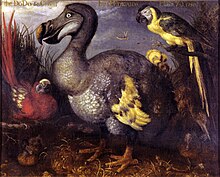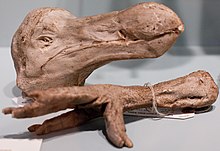Wikijunior:Extinct Birds/Dodo

The Dodo (Raphus cucullatus) is a flightless, extinct bird which inhabited the island of Mauritius, an island 1,200 miles south of the African Subcontinent. Very little information about the Dodo is present due to a lack of fossils.
How was the Dodo found?
[edit | edit source]It is believed that the Dodo was found by a Dutch Sailor in 1598 in Mauritius. The name, Dodo, means "Ugly, Disgusting Bird". It was named that because of the bird's abnormal appearance. Many believe that the Dodo only lived in Mauritius.
How is the Dodo extinct?
[edit | edit source]

The main reason why the Dodo is extinct is because it was a real target for food. Not only alive were they killed, but some of their eggs were eaten. Usual Dodo eggs were main food for vultures and coyotes. Which led up to the big extinction. It is to be believed that the last dodo was spotted, or seen, in around the 1660s or the early 1670s. There have also been various other animals that are extinct from Mauritius
What were the main predators?
[edit | edit source]
The main predators are mankind. Dodos went extinct because of Dutch sailors hunting them for food. Dodo eggs were also hunted by birds and other land animals on the island of Mauritius, which prevented new Dodos from coming about. The dodos also became prey to the Dutch sailors' animals, such as pigs, monkeys, and rats.
Recent News
[edit | edit source]- Source
- "Extinct Dodo Related to Pigeons, DNA Shows" - Hillary Mayell, for National Geographic News, February 28, 2002.
- Summary
The famous extinct Dodo, which has a pitiful reputation as a stupendously overweight idiot of a bird that couldn't even fly, has DNA related to the pigeon. Which DNA examinations show.
- Quotes
"Island taxa such as the dodo and solitaire often represent extreme examples of evolution—and if we want to examine how we, or the life around us, evolved then such animals are very educational, By examining island birds we can investigate how evolution works—because extreme examples are often the best views of how something works"
--Alan Cooper, a zoologist at the University of Oxford and one of the co-authors of the study.
Preservation of Dodos
[edit | edit source]The only traces of the Dodo's past are pictures and bones, which are preserved mostly in museums.
